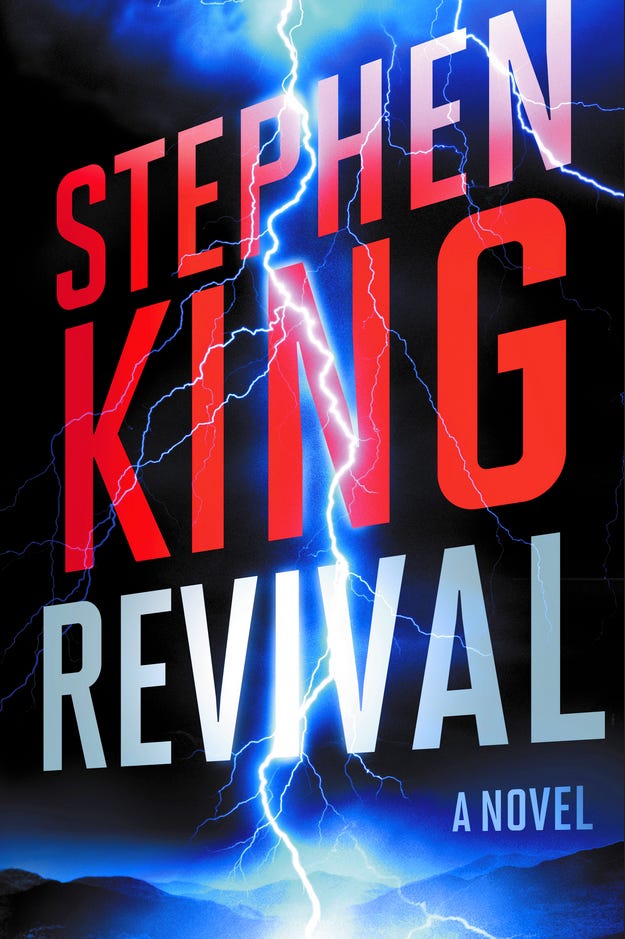Revival
Stephen King
Grief opens strange doors. You have to live a while, I think, or at least suffer a while, before you learn that loss is a key to hallways you didn’t know existed. Anyone who’s lost something precious, good, and true understands that those hallways wind in ways beyond words. Some of us visit for a time, and then exit into the light: altered, yes, but never to return. Some wander for years, unable or unwilling to risk a peace that might be forgetting. And some — some deny the hallways, and the loss, and the fact of a world without. Rather than accept the unacceptable, some would sooner tear that world asunder.
In 1965, Pastor Charlie Jacobs of the First Methodist Church of Harlow, Maine suffered a terrible loss and preached a terrible sermon. When he left town, a dark obsession already driving deep roots in his heart, he took the last shreds of nine-year-old Jamie Morton’s faith with him. Over the next fifty years, Jamie’s path repeatedly crosses that of his ex-minister in ways that Jamie hopes are coincidental. If their intertwined lives are fate, if all that happened was meant to happen, Jamie muses, “then there is no such thing as light, and our belief in it is a foolish illusion.”
“Revival” is one of the most autobiographical of Stephen King’s novels that I’ve read, from its first pages reaching all the way back to his Methodist childhood. I can usually tell when an author had a religious upbringing. Those who didn’t grow up that way fumble their portraits of faith in cartoonish ways, but King doesn’t do that. He might be no more than a skeptical theist today, telling NPR in 2013 that there’s “no downside” to belief, pointing to the suggestion of intelligent design all around us, and saying he chooses to believe in God though he has serious doubts and reserves the right to be inconsistent. Once upon a time, though, little Stevie King sat in Sunday School drinking in the stories of Noah and David and Daniel and Jesus, and he believed it all, and he remembers.
This authenticity is what suffuses “Revival” with the kind of warmth that can only flow from a breaking heart. The Mortons and the Jacobs are each the family of my own memories: full of youth, promise, energy, faith, hope, and love. I want them to stay that way always, never to suffer, never to lose. Life, though, has a way of taking chunks out of us. Addiction, abuse, disease, and death transform families and scatter their members down cold and solitary roads. King knows what those roads feel like, having traveled the same route of drug addiction as Jamie and having learned the power of a family that refuses to write you off. The antidote to the grief of living is the love of those who want you around despite yourself. “Home,” as Jamie says, “is where they want you to stay longer.”
Of course, “Revival” is not just Jamie’s story. In Charlie Jacobs we see Jamie’s negative exposure: a man equally addicted to elements beyond his control, just as committed to a path of self-destruction, but bereft of anyone either able or willing to pull him back from his terrible purpose — and this is what makes the novel frightful. Sure, Lovecraftian horrors hover behind the story. I don’t think it’s accidental that the name of Charles Daniel Jacobs is so tonally similar to Charles Dexter Ward, another man in another mythos whose fixation on forbidden knowledge destroyed him. But that’s just sizzle for the rubes, as one of King’s carnies might say.
Look: I get the central theme. King is using a bleak Lovecraftian frame to process his own uncertainties about death and what comes next. I do think, that because he’s a fundamentally hopeful guy, King draws in elements of his own Dark Tower mythos to hint that Jamie is on the path of the Beam. Darkness and decay can claim illimitable dominion all they want, but Roland and the White get a vote. I do also see King’s substantial critique, baked into the overall arc of Charlie’s life and fate, of organized religion as extractive, destructive, and irredeemable.
All that may be true. But what most struck me, the reason I find Charlie so haunting is that he’s a good man, he’s a kind man, he’s not a monster, not at first, not until grief hollows him out over decades, until obsession runs it bitter course, until only a shadow remains of the sweet young minister who knelt down to play toy soldiers with a six-year-old boy named Jamie. None of us thinks he’ll become the villain, and each of us thinks he’ll fade out in the arms of loving friends and family, but remember: grief opens strange doors to unknown hallways. The ghastly warning of “Revival” is not that nightmares scratch at the veil of space and time, but that in our pain we might curl inward only to look up and find they’re the only things waiting for us at the end.
Author: Stephen King

